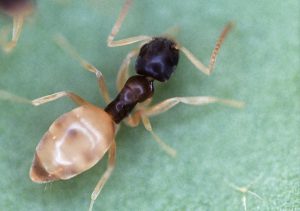Many people probably would like to conserve more water and use less spray to control annoying bugs. But first, they must meet their personal needs, University of Florida researchers say.
By “personal needs,” we’re talking about basic human needs described by Abraham Maslow 80 years ago. Those include water, food, sleep, shelter, a decent job, a happy home life and more.
Laura Warner and co-author John Diaz led a new study that examines the relationship between people’s basic needs and their inclinations to conserve water and use integrated pest management (IPM).

“We understand that most people do not consider water conservation on its own, and we are continuously trying to understand what additional factors contribute to or inhibit water conservation,” Diaz said. “So, since IPM and water conservation are both landscape practices, we were curious if there was a connection between them.”
“We also realized that landscape and conservation decisions were probably connected to daily life decisions and factors. There’s already some anecdotal evidence of that in earlier research,” said Diaz, an assistant professor of agricultural education and communication at the UF/IFAS Plant City campus.
This research was the first to determine this connection through empirical data.
“We not only found the connection of IPM and water conservation, but also the other needs that make up an individual’s personal decisions,” said Warner, an associate professor of agricultural education and communication at the main UF campus in Gainesville.
For the new study, UF/IFAS social scientists surveyed 2,061 people in a national online questionnaire. Researchers found that people with a strong sense of well-being tend to conserve more water and use IPM than those who don’t get their basic life needs met.
“Consider someone who is struggling to put food on the table or maintain personal health,” Warner said. “Until these lower levels are met, they will have little, if any, ability to focus no things such as landscape practices.”
IPM and more efficient irrigation translate to improved aesthetics and more wildlife, such as pollinators, Warner said.
Scientists espouse IPM, a concept that integrates several pest-control methods. Those can include using less-toxic bug control methods first (and only after a pest is identified) and using so-called “good bugs” to eat “bad bugs,” a process known as “biological control.”
Where does IPM intersect with water conservation?
“If we consider them together, landscape irrigation, water conservation and IPM can help us reduce impacts on water availability and quality,” Diaz said. “IPM and water conservation programs are usually delivered independently of one another, but each may be a conduit to the adoption of the other.”
-30-
The mission of the University of Florida Institute of Food and Agricultural Sciences (UF/IFAS) is to develop knowledge relevant to agricultural, human and natural resources and to make that knowledge available to sustain and enhance the quality of human life. With more than a dozen research facilities, 67 county Extension offices, and award-winning students and faculty in the UF College of Agricultural and Life Sciences, UF/IFAS brings science-based solutions to the state’s agricultural and natural resources industries, and all Florida residents.
 0
0
